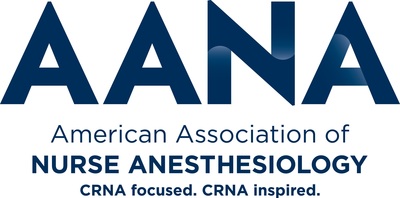In a letter to the U.S. Department of HHS, the AANA has partnered with 24 national organizations to request Secretary Alex Azar support key provisions of the U.S. president’s executive order #13890, which provides a path to the permanent removal of burdensome supervision and licensure requirements for non-physician providers such as Certified Registered Nurse Anesthetists.
PARK RIDGE, Ill., April 21, 2020 /PRNewswire/ -- (AANA)—In a letter today to the U.S. Department of Health and Human Services, the American Association of Nurse Anesthetists (AANA) has partnered with 24 national organizations to request Secretary Alex Azar support key provisions of the U.S. president's executive order #13890, which provides a path to the permanent removal of burdensome supervision and licensure requirements for non-physician providers such as Certified Registered Nurse Anesthetists (CRNAs).
According to the signatories, the reform "will help increase access to care, curb costs for patients, and improve healthcare delivery. We are writing to support you in your efforts as you work to implement the executive order." The full content of the letter is available.
"We are pleased that our voices are being heard so that patients suffering from the novel coronavirus can receive the high-quality care they deserve," said AANA President Kate Jansky, MHS, CRNA, APRN, USA LTC (ret).
As advanced practice nurses, CRNAs have vast experience in critical care settings and advanced education and training in anesthesiology. CRNAs provide care across all settings and in all patient populations and are the primary providers of anesthesia care in rural and underserved areas and on the battlefield in forward surgical teams.
"Since the outbreak of COVID-19, CRNAs have continued to provide top-of-the-line anesthesia care, but they have also seen their roles change drastically," said AANA CEO Randall D. Moore, DNP, MBA, CRNA. "CRNA expertise in airway management, hemodynamic monitoring, management of patients on ventilators, placement of invasive lines, and overall management of critically ill patients uniquely positions them to provide life-saving care," he said.
The letter to Secretary Azar specifically sites CRNAs:
"We appreciate the administration's efforts to ensure that providers like advanced practice registered nurses (APRNs) and physician assistants (PAs) can practice to the full extent of their medical training and education and that patients are afforded the opportunity to see the provider of their choice. We strongly support the swift action the Centers for Medicare and Medicaid Services (CMS) took in temporarily removing Medicare physician supervision requirements for Certified Registered Nurse Anesthetists (CRNAs) and other unnecessary barriers for qualified advanced providers during the COVID-19 pandemic. The patients benefitting from this move will serve as a positive example for permanently removing these barriers for all APRNs following the health crisis. Permanently removing these barriers will increase competition, network adequacy and make much needed reforms to the healthcare system. This order will ensure that all licensed providers are able to see their patients without undue burdens or unnecessary regulations that don't improve safety or patient outcomes."
This past fall, the AANA deemed the signing of an executive order to protect and improve Medicare a strong step toward ensuring access to high-quality anesthesia care and enabling nurse anesthetists to practice at the top of their license. In response to the COVID-19 pandemic, the Centers for Medicare & Medicaid Services has temporarily suspended physician supervision requirements for CRNAs—another action that the AANA deemed a critical step for CRNAs to serve the U.S. healthcare system more effectively.
![]() View original content to download multimedia:http://www.prnewswire.com/news-releases/aana-partners-with-24-organizations-to-ensure-access-to-quality-patient-care-301044735.html
View original content to download multimedia:http://www.prnewswire.com/news-releases/aana-partners-with-24-organizations-to-ensure-access-to-quality-patient-care-301044735.html
SOURCE American Association of Nurse Anesthetists





